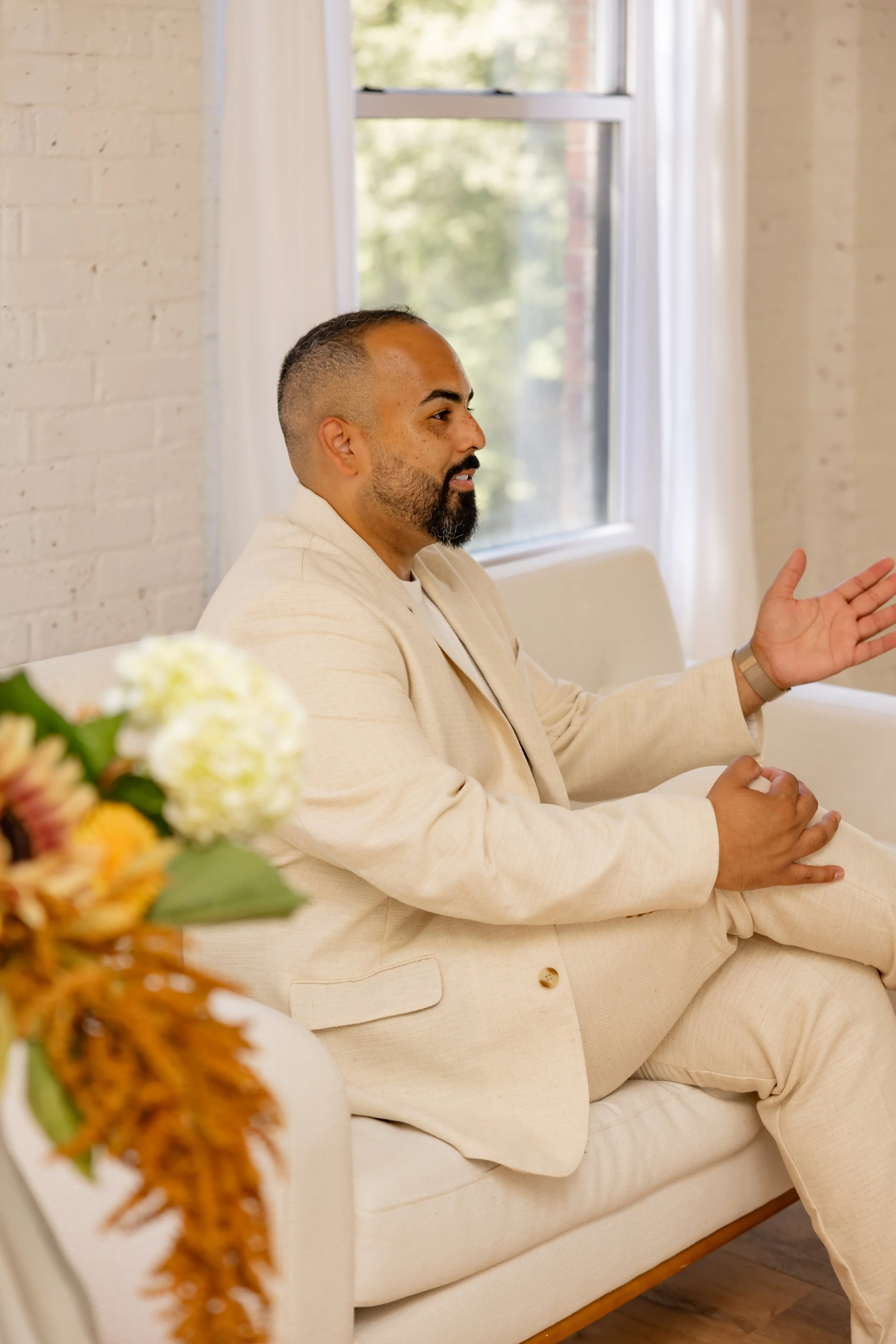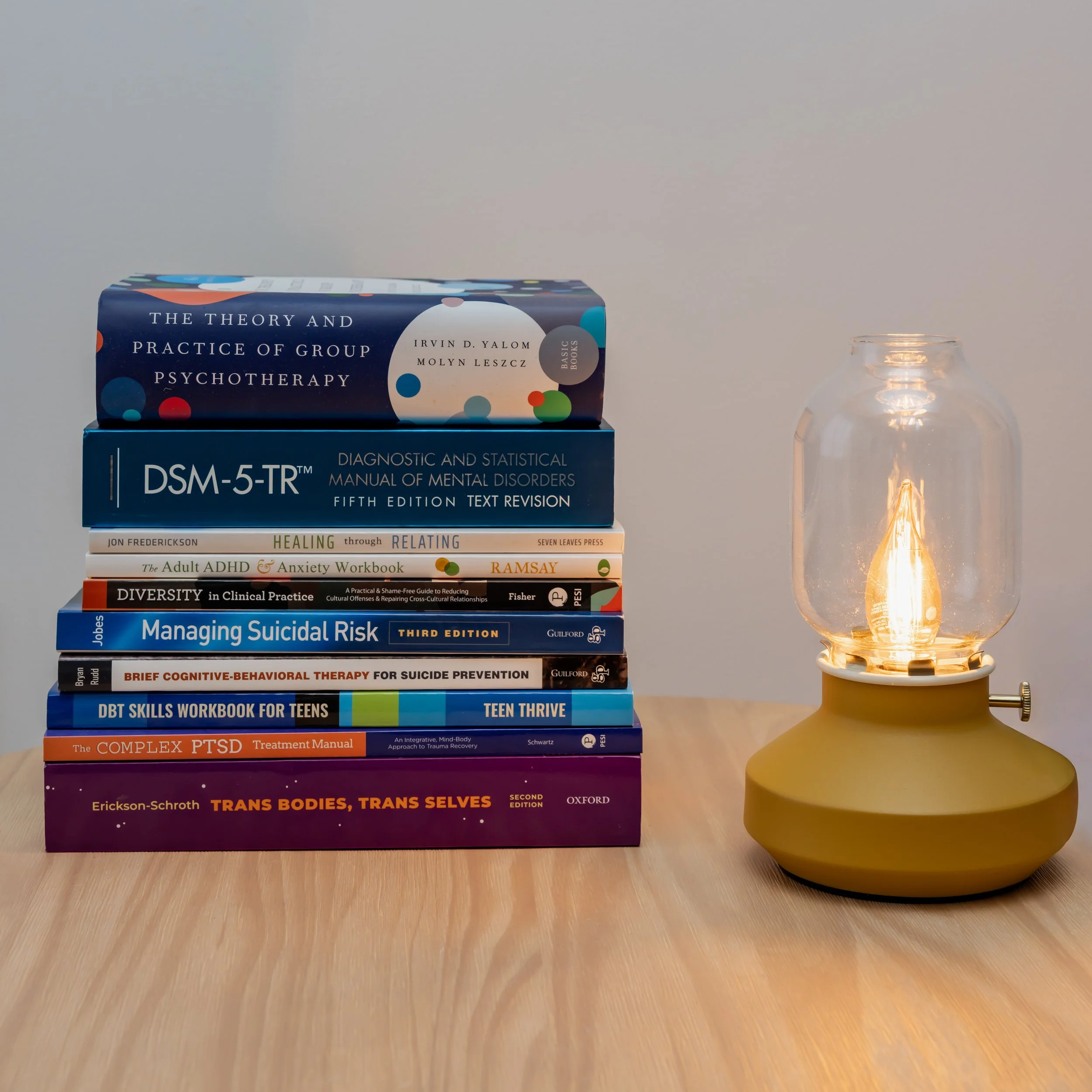Where healing happens in the light
About
Lumira Psychotherapy Studio
Lumira Psychotherapy Studio is a boutique practice where healing happens in the light. Nestled in Croton Falls, NY—just steps from Metro-North—Lumira was founded by David Vidaurre, LCSW, to provide a warm, trauma-informed space for healing, reflection, and growth.
Created for those seeking private, concierge-style care, therapy at Lumira is spacious, honest, and deeply human. It is a place where reflection meets restoration—where clarity emerges gently and healing unfolds in its own time.
“I believe the relationship is the most vital part of our work. My goal is to help you become the best version of yourself—honoring that healing happens in the light and becomes possible when you feel safe enough to embrace that truth.”
Lumira Psychotherapy Studio is a boutique practice where healing happens in the light. Located in Croton Falls, NY—just steps from Metro-North—Lumira was founded by David Vidaurre, LCSW, to offer a warm, trauma-informed space for healing, reflection, and growth.
You don’t need to be in crisis to seek healing. Sometimes the most profound shifts happen when you finally give yourself permission to slow down, to listen inwardly, and to trace the threads of what has become beautifully but painfully tangled within. If you’ve ever looked steady on the surface while feeling unsettled beneath, you’re not alone.
Lumira welcomes clients seeking private, concierge-style care. Therapy here is spacious, honest, and deeply human. Whether you are new to therapy or returning to the work, Lumira offers a calm and collaborative studio where clarity and healing can unfold.
Grounded in science, but guided by humanity, Lumira Psychotherapy Studio fosters healing through authentic connection and a culturally responsive lens.
If you’ve been asking yourself:
What would change if I stopped doing this alone?
What would it feel like to finally exhale?
Am I allowed to want more from therapy?
Then you’re in the right place. Let’s begin.
About David:
I became a therapist not just to treat symptoms, but to create spaces where people feel seen, heard, and human again. Many of my clients come to me after trying therapy before and feeling like something was missing—like they were being talked at rather than truly listened to. I offer something different: calm, grounded care that honors both your pain and your potential.
I’m a bilingual licensed clinical social worker, educator, and supervisor with more than a decade of experience helping individuals navigate personal, professional, and relational transitions. I founded Lumira Psychotherapy Studio as a space for those seeking clarity, connection, and deep healing.
My clinical experience spans work with adolescents, young adults, and professionals—from middle school students to university populations—across inpatient, outpatient, and residential settings. For nearly a decade, I’ve worked at Silver Hill Hospital, serving in programs for Executive Professionals, Substance Use and Co-Occurring Disorders, and Borderline Personality Disorder, Anxiety, Bipolar Disorder, and Depression. Earlier in my career, I served as a psychotherapist, clinical supervisor, and Assistant Director at a young adult outpatient program in New York City, supporting individuals ages 17 to 35 as they navigated identity, transition, and recovery.
Beyond clinical practice, I am an educator and supervisor, teaching in the Master of Social Work program at Fordham University at both Lincoln Center and Westchester campuses. I also provide life coaching and accountability partnerships for individuals seeking consistent support, structure, oversight, and goal setting.
My work is informed by evidence-based and experiential approaches that support meaningful, lasting change—but not defined by them. These methods offer a strong foundation, while the heart of the work remains rooted in presence, curiosity, and connection. Research guides the process, but relationship leads the way.
My style is direct, collaborative, and rooted in mutual respect. Over the years, I’ve taught, supervised, and held space for people at every stage of healing—but what matters most in the therapy room isn’t my résumé; it’s how I show up: consistently, authentically, and with heart.
I welcome all who seek clarity, connection, and relief. My work often draws those navigating transitions, men learning to embrace vulnerability, professionals seeking balance, members of the LGBTQ+ community seeking affirmation, and students finding their way. I invite you in.
My vow is to be a safe place for you to land.
-

Individual Psychotherapy
For adults and adolescents ready to feel more grounded, at ease, and connected to themselves.
Therapy at Lumira offers more than a place to talk—it’s a space to slow down, untangle what’s been carried too long, and rediscover steadiness within. Rooted in evidence-based and experiential approaches, sessions integrate the insight of CBT and DBT with the depth of human connection and safety. Each experience is collaborative, never judgmental, and always compassionate—supporting meaningful growth, healing, and balance across all areas of life, including recovery, identity, and emotional resilience.
My work is shaped by over a decade of experience across inpatient, outpatient, residential, and academic settings. I have worked within schools and continue to teach at the university level, experiences that have deepened my understanding of development, learning, and the challenges faced by both adolescents and adults. Clinically, I have supported individuals living with mood disorders such as depression and bipolar disorder; thought disorders including schizophrenia; personality and anxiety disorders such as OCD and ADHD; as well as struggles related to addiction—both substance use and process-based—and sexuality or identity exploration.
These experiences inform a grounded and relational approach that honors the full spectrum of the human experience—meeting each person with curiosity, respect, and care.
-

Executive Coaching & Parents
Executive coaching at Lumira bridges insight and action—fostering sustainable growth through accountability, structure, and collaboration. Sessions help you strengthen executive functioning, emotional regulation, and follow-through, supporting balance and purpose across both personal and professional domains.
For parents of adolescents and adults navigating the complexities of mental health treatment, boundaries, and communication.
Parent sessions at Lumira offer guidance and reflection to help you support your loved one while staying grounded in your own resilience and emotional well-being. Together, we cultivate understanding, compassion, and confidence as you navigate change within your family system.
-

Group Psychotherapy & Relational Therapy
Small, intimate groups designed to foster depth, connection, and genuine growth.
Each group at Lumira is built around a focused theme—such as men’s wellness, emerging adulthood, emotional healing, or Dialectical Behavior Therapy (DBT). Group size is intentionally limited to create safety, vulnerability, and meaningful exchange. Together, members learn, practice, and heal within a shared space of authenticity and understanding.
At Lumira, couples therapy invites reflection and reconnection—helping partners listen with empathy, speak with intention, and rediscover the shared light that sustains their bond.
Together, we explore patterns of communication, rebuild trust, and create new pathways toward understanding and closeness. -

Clinical Supervision
A reflective, growth-oriented space for clinicians to strengthen their skills, deepen self-awareness, and cultivate professional confidence. Together, we integrate theory, ethics, and lived experience to support both clinical excellence and authentic presence in practice.
Licensed in Connecticut and New York, and SIFI-certified, David provides supervision informed by trauma-informed, relational, and evidence-based frameworks.





